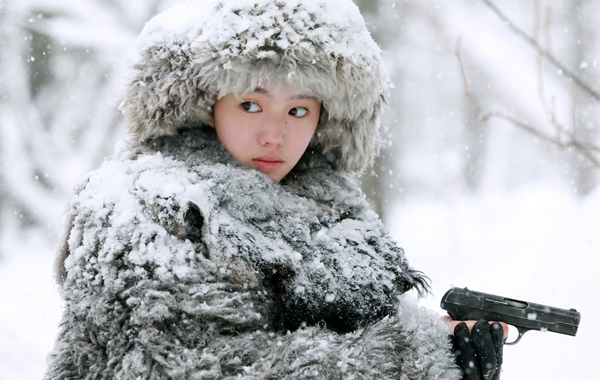 (China Daily) Director and master storyteller conquers new genres as he continues to entertain audiences, Xu Fan reports.
(China Daily) Director and master storyteller conquers new genres as he continues to entertain audiences, Xu Fan reports.At the age of 71, Zhang Yimou still relishes the "lights, camera, action" moment of his work. The iconic master of China's celebrated fifth-generation directors still enjoys his packed schedule, which demands creativity and productivity.
Five months after One Second, considered the auteur's love letter to cinema, received widespread acclaim, his latest offering Cliff Walkers hit local theaters on April 30 as one of 12 new movie releases. On May 3, it deposed My Love as the top grossing movie in the country.
In more good news for his diehard fans, they will not have to wait too long to enjoy the renowned filmmaker's next project. The Coldest Gun, the tale of a legendary sniper which Zhang co-directs with his daughter, is scheduled to hit cinemas in October.
Marking Zhang's first foray into the espionage genre, Cliff Walkers-set in the Japanese-occupied puppet state of "Manchukuo" during the War of Resistance Against Japanese Aggression (1931-45)-follows four Soviet Union-trained Chinese agents attempting to sneak into Harbin, the capital of Heilongjiang province, to rescue an escapee from a camp where the Japanese are conducting lethal experiments on prisoners.
During his recent interviews with the popular video platforms Bilibili and Douyin, Zhang says he has always been interested in stepping into new genres, as he believes the Chinese film industry needs to expand its variety of movies to match its massive market scale.
Despite spy films being a popular genre in world cinema, China's silver screens have, in contrast, generally depended on action blockbusters or comedies.
Highlighting the fact that The Message-a 2009 Chinese espionage movie starring Zhou Xun and Li Bingbing-was a box-office success, Zhang says that, since then, few hit spy movies have been produced. As a result, he decided to delve into the genre after being contacted to direct Cliff Walkers.
Scriptwriter Quan Yongxian says the story is sort of a loose prequel of his 2012 TV series The Brink, about a couple of heroic underground Communist Party members.
Quan, a native of Jiamusi in Heilongjiang province, says he has a strong personal interest in the wartime history of northeastern China and how people there resisted the Japanese invaders.
As his elder sister worked at a local chronicle archive, Quan managed to read historical records, stumbling upon the thrilling details of a prison break from Zhongma Fortress in 1934. This was a death camp located in Beiyinhe village outside Harbin, where the Japanese army conducted biological warfare research on prisoners.
More than 10 Chinese managed to escape from the prison, but most died soon after being recaptured or from hunger and injury. Only a few managed to survive.
One of the survivors-who died on the battlefield fighting the Japanese two years later-was the inspiration for the film's plot. Quan conceived the script as a tribute to mark those lesser-known heroes.
China's revolutionary titles are mostly produced by Chinese mainland companies, but Cliff Walkers attracted the attention of the Hong Kong studio Emperor Motion Pictures, which is one of its main producers and will handle the movie's international distribution.
Alex Yeung, vice-chairman of Emperor Motion Pictures and the movie's co-executive producer, recalls that his father Albert Yeung met with director Zhang for the first time in June 2018.
"They hit it off immediately. They soon agreed to collaborate on a quality film that makes people shout 'bravo'. In the same year, we further developed this film and production kicked off in 2019," recalls Alex Yeung.
Datong in Shanxi province doubles as old-time Harbin, with reconstructions of buildings and streets, while snowy scenes were shot in Xuexiang, or Snow Town, in Heilongjiang province.
Admitting that the film has also enriched his knowledge about China's revolutionary martyrs, he says: "I felt quite overwhelmed when I heard this story for the first time. That generation (the early members of the Communist Party of China) was stoic and dedicated. They are the true nameless heroes who contributed to build a safe and harmonious society and deserve to be remembered."
With China effectively bringing COVID-19 under control, and the distribution of vaccines, the domestic film industry has seen a recovery from the second half of last year.
"There is no doubt that the government has helped us resume work and production in an orderly manner by taking effective measures to control the pandemic," Alex Yeung says.
"I firmly believe that the Chinese film market will continue to flourish. However, I think that the audience's aesthetic sensibility is continually increasing, and that they have higher expectations for the content and production of movies, which spurs filmmakers to improve," he concludes.
Source: By Xu Fan | China Daily | Updated: 2021-05-07 08:08



